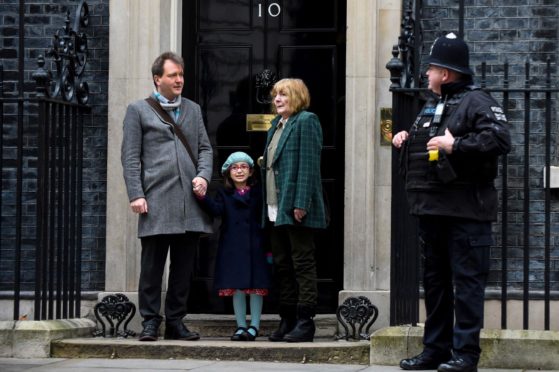Just over a year ago, when the Iranian government allowed Gabriella to board a plane to be reunited with her father, Richard, in Britain, it was a bitter-sweet tale.
Gabriella, then five, had left Britain with her mother, Nazanin, as a 22-month-old baby. What did she know of western ways? What did she know of her father, for that matter? And what did he know about suddenly being daddy to a five year old instead of the baby he knew? Those things, though, were surmountable. It was Nazanin, still languishing in an Iranian jail on trumped up espionage charges, that worried me, especially when last New Year dawned.
Nazanin had been arrested when trying to return home to Britain after visiting her parents. Afterwards, Gabriella had lived with her grandparents, visiting her mother regularly. And I tried to imagine then, what it felt like for Nazanin to see her in the flesh for the very last time in that prison, to know that this hug was the finale, that the anticipation of the smell of her hair, and the feel of her childish arms, would no longer sustain her during incarceration. Did she smile and tell Gabriella she was going on a great adventure? When the door finally closed, what part of her left with her child?
Moral duty
New Year is a time of reflection, of looking back, and then looking forward with optimism. But this year, Nazanin Zaghari-Ratcliffe is still in jail and the Iranian government has introduced fresh charges, apparently to detain her beyond her release date. So, it was with some incredulity that I read the latest Foreign Office statement saying the department had, “no statutory duties owing to citizens held abroad even if they were the subject of torture”.
If there is no statutory duty on a nation to do everything to support its citizens from the tyranny of a foreign power, then there should be. There is certainly a moral duty, particularly in this case.
Zaghari-Ratcliffe’s imprisonment, many believe, is due to an unpaid debt of £400million that the UK owes Iran after a cancelled arms order in the mid 70s, following the fall of the Shah. Diplomatically, her case has been mishandled from the start, with Boris Johnson, in his brief tenure as foreign secretary, wading carelessly into the row with all the delicacy of a hippopotamus in pointe shoes. As far as he understood, Nazanin, an administrator with the Thomson Reuters foundation, was ehm… just teaching journalism…or something. He understood nothing. The claim, both untrue and unhelpful, was subsequently used by the Iranian government.
The Foreign Office position is so outrageous that it was highlighted internationally, including in the New York Times. Even ex-foreign Secretary Jeremy Hunt – who took the rare step in March 2019 of granting Zaghari-Ratcliffe diplomatic protection to signal that any offence against her was an offence against the British state – protested, saying that Britain was looking increasingly weak in its protection of its citizens.
Generations united
Instead, it has been left to human rights organisations – and thank God for them – to campaign. Before Christmas, Amnesty UK made a film, “Two Daughters”, about a meeting between six-year-old Gabriella and 34-year-old Elika Ashoori, daughter of Anoosheh Ashoori who is also a dual Iranian-British national, held in Iran for the last three years. They are separated by generations, says Ashoori, but are united in a profound way.
In the film Gabriella, pert, bright, lively, writes a Christmas letter to the British Prime Minister. “Dear Boris Johnson, Please can you bring my mummy home. She has been good.”
But now it is New Year again. The jail doors in Iran remain closed. Gabriella is in Britain with a father who fights doggedly, admirably, for his wife. She still longs to see her mother. Elika still longs to see her father. Nazanin’s health struggles have seen cancer scares and the prescription of beta blockers for panic attacks. Who wouldn’t panic in her circumstances, a Kafkaesque vortex in which more and more of her life is swallowed up?
Perhaps the cruellest form of human torture is the removal of hope. What hope, I wonder, does Nazanin Zanghari-Ratcliffe start 2021 with? Certainly, the Foreign Office has given her nothing to believe in. Which only leaves the rest of us. Letters to MPs, campaigns and petitions. For those unjustly imprisoned, the only hope is that the world still shouts your name, that people still fight for you, that the fragile flame of possibility remains ever lit and protected.

